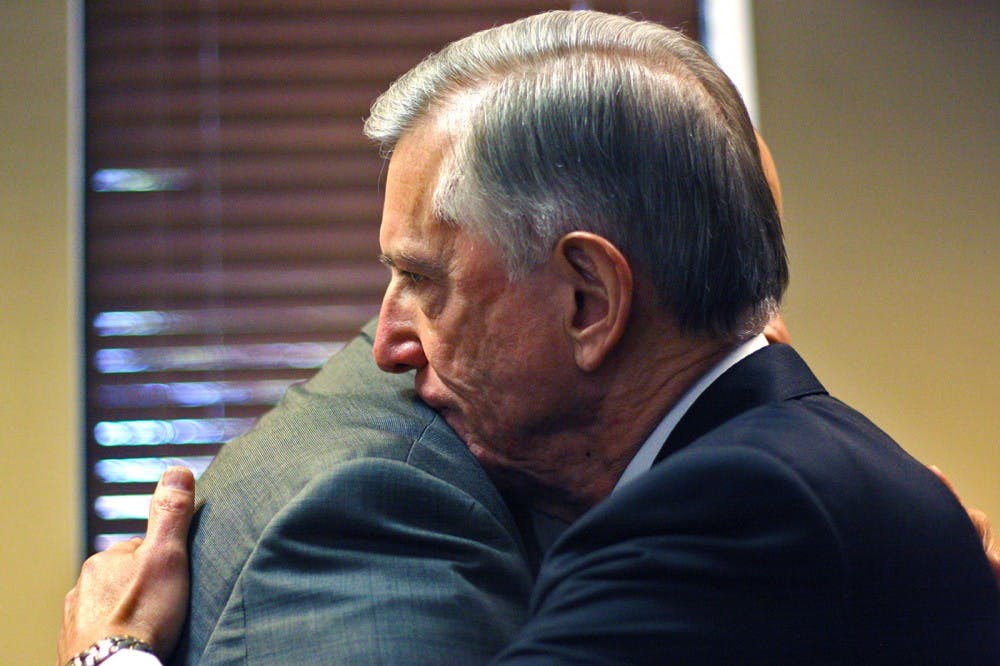Fennebresque said only that the board had a different timeline for Ross’ tenure as president and that a new leader could bring different assets, which he did not name specifically.
The board went into closed session for two hours on Friday before announcing Ross’ resignation. Once the board returned to open session, only Marty Kotis voted against the settlement.
Kotis said in an interview that he’d only heard about the decision on Thursday and there hadn’t been discussion by the personnel and tenure committee or by the full board prior to Friday.
“I don’t believe that’s enough time for the Board of Governors to provide proper oversight,” he said. “I also don’t believe the chairman should take pretty serious actions without the full consent of the board.”
Ross said he respects the board’s right and responsibility to appoint UNC-system presidents as it sees fit, though he had no plans to leave.
“It’s not an easy thing for me because I love it, and I would love to be here forever,” he said.
Members of the UNC BOG Democracy Coalition, who attended Friday’s meeting, voiced as a group that they were disheartened by the board’s decision to push out a president who had been so successful in the role.
But Leonard said he thinks Ross’ success at insulating the system from changes being contemplated at the legislature could have contributed to his ousting. Ross stood against these shifts, Leonard said — such as budget cuts and a narrowly vocational focus for higher education.
“He’s just very adept at maintaining the kind of consensus or near consensus that will keep the university on track,” he said. “If you put it in the broader context of the kinds of changes that are being pushed ... turning aside reforms that are potentially disruptive would irritate some people.”
Playing politics?
Given that Ross is a registered Democrat who formerly worked as executive director for the Z. Smith Reynolds Foundation, which has given generously to liberal causes, it didn’t take long for people to blame politics for Ross’s departure.
To get the day's news and headlines in your inbox each morning, sign up for our email newsletters.
The Board of Governors is appointed by the legislature, which since the 2010 election — weeks after Ross had officially been named president — has been in Republican control.
“(The UNC system) isn’t a partisan institution, but it’s clearly part of the public realm, so it’s not totally divorced from politics,” said Ferrel Guillory, UNC journalism professor and director of the Program on Public Life.
Scott Hicks, a UNC-Pembroke English professor and chairman of the faculty, said in an email that the political changes have been noticeable on campus.
“Faculty have felt themselves to be targeted and devalued in the current political climate, and the president’s removal suggests the further erosion of the university’s autonomy,” he said.
Leonard said he thinks the current board is more likely to put its relationship with the legislature ahead of protecting the UNC system.
But Fennebresque said repeatedly on Friday that politics weren’t involved in the decision to ask Ross to leave.
“It’s my understanding of Board of Governors history that people have generally left their politics at the door. I can’t tell you the registration of my fellow board members,” he said.
Former board member Burley Mitchell added that he didn’t think politics played a major role in decision-making during his time on the board.
“It was just like we were all one party,” he said. “Everybody just had total confidence in (former UNC-system president) Erskine Bowles not being partisan, and I have thought the same about Tom Ross.”
Still, when Democrats controlled the legislature, Mitchell said, they had an agreement where Republicans in both chambers could appoint a certain number of members.
He estimated that when he left in 2010, at least 10 of the 32 voting members of the board were Republicans. Currently, two board members are registered Democrats.
Mitchell said he wasn’t surprised that the current board decided to force Ross to resign.
“Had I been on the board, I would’ve voted against it,” he said. “But it’s quite natural that when you have a major change of governance ... there will be some change of direction.”
Acting in the name of a specific party is nothing new, Guillory said.
“My sense of the situation is that the board didn’t replace Tom Ross with any particular person,” he said. “They just acted in the American tradition of patronage, you could call it. When a particular party wins an election, they get the spoils.”
Kotis, who was appointed to the board by the N.C. Senate, said that to his knowledge, the chamber wasn’t involved.
“I’m very close with members of the Senate,” he said. “I can tell you that the Senate takes ownership of its actions, and this clearly did not come from the Senate.”
The terms of Ross’ employment agreement give him a year of research leave at half of his $600,000 annual salary and a tenured faculty position in the UNC-CH School of Government starting in 2017.
Guillory said Ross’ persistence in the face of challenging finances — including implementing a strategic plan that sought to prioritize efficiency and increase the state’s college degree attainment — reflected his passion for the system.
“Without assurances that the next president of the system will be equally dedicated, it’s unsettling to people like me that we won’t have Tom Ross as the leader of the system, at least not beyond this year,” he said.
Former UNC-CH chancellor James Moeser said in a statement that he finds it hard to believe politics didn’t motivate Ross’ ousting — particularly given Fennebresque’s inability to find a better reason during Friday’s news conference.
“Meanwhile, President Ross sat by with consummate grace and poise,” he said. “What a contrast. When they say it is not about politics, it is about politics.”
state@dailytarheel.com



